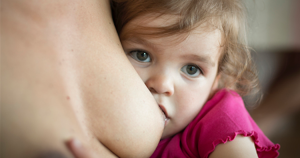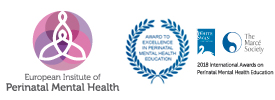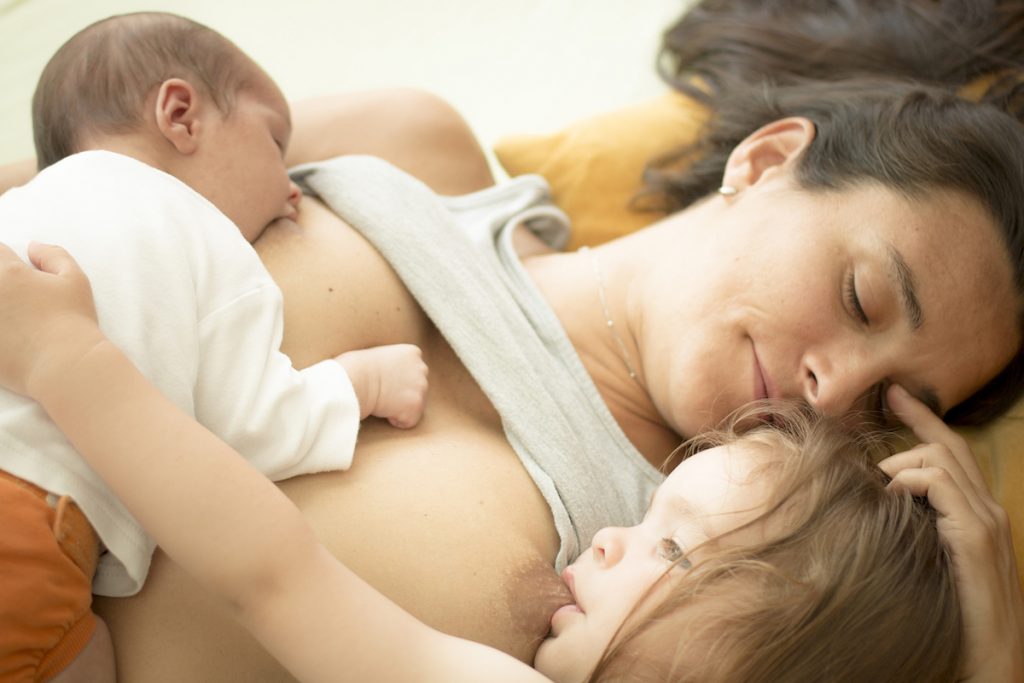BREASTFEEDING AND MENTAL HEALTH
May 2020 to August 2020
Please visit:
Psychology and neuroscience of breastfeeding:
an introductory course
Directed by
Ibone Olza, MD, PhD, perinatal psychiatrist
Carmela K Baeza, MD, IBCLC
This course has been awarded 26 CERPS (24L – 2R)
by the International Board of Lactation Consultant Examiners (IBLCE)
CERPs Registry Number: 319082K
The European Institute of Perinatal Mental Health launches this annual training focused on the most psychological, neurobiological and sociocultural aspects of breastfeeding. The training is based on the ecosystemic model of perinatal mental health attention, that on one hand acknowledges the neurobiological and affective needs of infants and their mothers in the perinatal period to then include the psychological processes of mothers and babies in the dyadic interaction. But it also recognizes the presence of the couple, the systemic processes of the family, the interaction with the professionals who attend them and the social and cultural context in which the upbringing will take place.
This Breastfeeding and Mental Health Training aims to cover a training gap in the field of breastfeeding, providing a rigorous evidence based update on topics such as the psychobiology of breastfeeding, the neurobiology of bonding, maternal psychology and detection and treatment of maternal or infant mental disorders, as well as alterations in the mother-baby relationship in the context of breastfeeding. We will give a deep insight on how to help and encourage breastfeeding in situations of stress or personal or family psychic suffering, in the understanding of how they influence or interfere with the psychological and psychopathological processes in breastfeeding and in the treatment of these conditions.
Despite the scientific, medical and social consensus regarding the benefits of breastmilk and the benefits of breastfeeding for the health of mothers, newborns and small children, the current rates of breastfeeding in the Western world are far from the recommended by the WHO (World Health Organization) or the Spanish Association of Pediatrics (AEPED). Although a majority of women wish to exclusively breastfeed their babies after birth, there are still few who actually manage to achieve their goals satisfactorily.
 Traditionally, breastfeeding promotion has been focused on making visible the benefits for mothers and babies. However, less has been done to deepen into the personal reasons that underlie early weaning. Although we know about the intimate, emotional and sexual dimension of the experience, the psychological aspects of breastfeeding are often omitted in the training received by professionals who attend these mothers. This omission leads to the situation that when mothers present difficulties or psychic suffering during postpartum, these needs are rarely detected or attended. In fact, neither the IHAN (Spanish Unicef program promoting Babyfriendly hospitals), nor the 10 steps program specifically consider mental health as an issue, nor do they offer specific training on how to care for mothers who present psychopathology during the perinatal period or related pathologies (Vanderkruik, Lemon, & Dimidjian, 2015).
Traditionally, breastfeeding promotion has been focused on making visible the benefits for mothers and babies. However, less has been done to deepen into the personal reasons that underlie early weaning. Although we know about the intimate, emotional and sexual dimension of the experience, the psychological aspects of breastfeeding are often omitted in the training received by professionals who attend these mothers. This omission leads to the situation that when mothers present difficulties or psychic suffering during postpartum, these needs are rarely detected or attended. In fact, neither the IHAN (Spanish Unicef program promoting Babyfriendly hospitals), nor the 10 steps program specifically consider mental health as an issue, nor do they offer specific training on how to care for mothers who present psychopathology during the perinatal period or related pathologies (Vanderkruik, Lemon, & Dimidjian, 2015).
Goals:
- To provide knowledge for mental health care professionals about the psysiology of breastfeeding, as well as about the main difficulties that may hinder breastfeeding.
- To provide knowledge in perinatal psychology, such as postpartum psychology and possible psychopathological conditions during postpartum to healthcare professionals who care for nursing mothers.
- To offer tools for an effective breastfeeding support in an individualized way, taking into account the psychosocial nature of breast-feeding.
- To offer tools for the treatment of postpartum maternal mental disorders in nursing mothers.
Methodology:
The course is recorded in english and offered entirely online.
Includes:
* Recorded 60 – 90 minute classes to watch at your leisure.
* Additional teaching material for each topic.
* Access to internal online forum for support and networking with course teachers and students.
* There will be 5 written assignments, necessary in order to obtain the final certification.
Classes will be available for you to view at your own pace from May 2020 until August 31st, 2020.
Program:
- Ecosystemic perspective and evolutionary reasons for breastfeeding. Ibone Olza, MD PhD infant psychiatrist. How breastfeeding works: hormones, reflexes, mechanisms of production and composition of breast milk. Physical and psychological benefits of breastfeeding for child, mother and society. Carmela Baeza MD, IBCLC.
- Neurophysiology of childbirth and breastfeeding. Definitions of self-regulation, on demand, trust. Ibone Olza, MD PhD infant psychiatrist
- Mother-to-mother breastfeeding support groups as a space for maternal development. Inma Mellado, IBCLC, LLL leader
- The beginning of breastfeeding: care during childbirth, birth and immediate puerperium. Carmela Baeza MD, IBCLC
- The impact of interventions during childbirth on breastfeeding. Ibone Olza, MD PhD infant psychiatrist
- Breastfeeding after cesarean. Ibone Olza, MD PhD infant psychiatrist
- Breastfeeding, attachment and mental health. Ibone Olza MD Ph infant psychiatrist
- The brain and maternal behavior. Prolactin and oxytocin. Susanna Carmona psychologist PhD neuroscience
- Psychology of the puerperium. Ibone Olza, MD PhD infant psychiatrist
- Observation of babies and dyadic interaction. Ibone Olza, MD PhD infant psychiatrist
- Social and cultural aspects related to breastfeeding. What makes it so difficult to breastfeed today? María José Garrido, PhD Social and Cultural Anthropology.
- Communication skills in breastfeeding. Inma Mellado, IBCLC, LLL leader
- Breastfeeding observation. Common difficulties during the first weeks. Carmela Baeza MD, IBCLC
- The role of fathers in breastfeeding. Javier de Domingo, clinical psychologist and Ibone Olza, MD PhD infant psychiatrist
- Sexuality and lactation. Carmela Baeza MD, IBCLC
- Ecofeminism and breastfeeding. María José Garrido, PhD Social and Cultural Anthropology.
- Low milk supply: medical treatments and specific situations. Carmela Baeza MD, IBCLC
- Postpartum depression and anxiety. Ibone Olza MD Ph infant psychiatrist
- Infant sleep and breastfeeding. María Berrozpe PhD Biological Sciences, infant sleep researcher.
Adressed to:
Medical doctors, nurses, psychologists, social workers, midwives, lactation consultants, etc. as well as students of these professions related to maternal and infant health.
Professors
- Ibone Olza, MD PhD perinatal&infant psychiatrist
- Carmela Baeza MD, IBCLC
- Inma Mellado, IBCLC, LLL leader
- Barbara Figueiredo PhD, clinical psychologist
- Susanna Carmona psychologist PhD neuroscience
- María José Garrido, PhD Social and Cultural Anthropology
- Javier de Domingo, systemic psychologist
- María Berrozpe PhD Biological Sciences, infant sleep researcher
Fees:
Please, consult this classification of countries of the world bank according to the level of income.
- Tier 1 countries: 450€
- Tier 2 countries: 360€
- Tier 3 countries: 270€
Enrollment
OUR PHILOSOPHY
The ecosystemic focus


